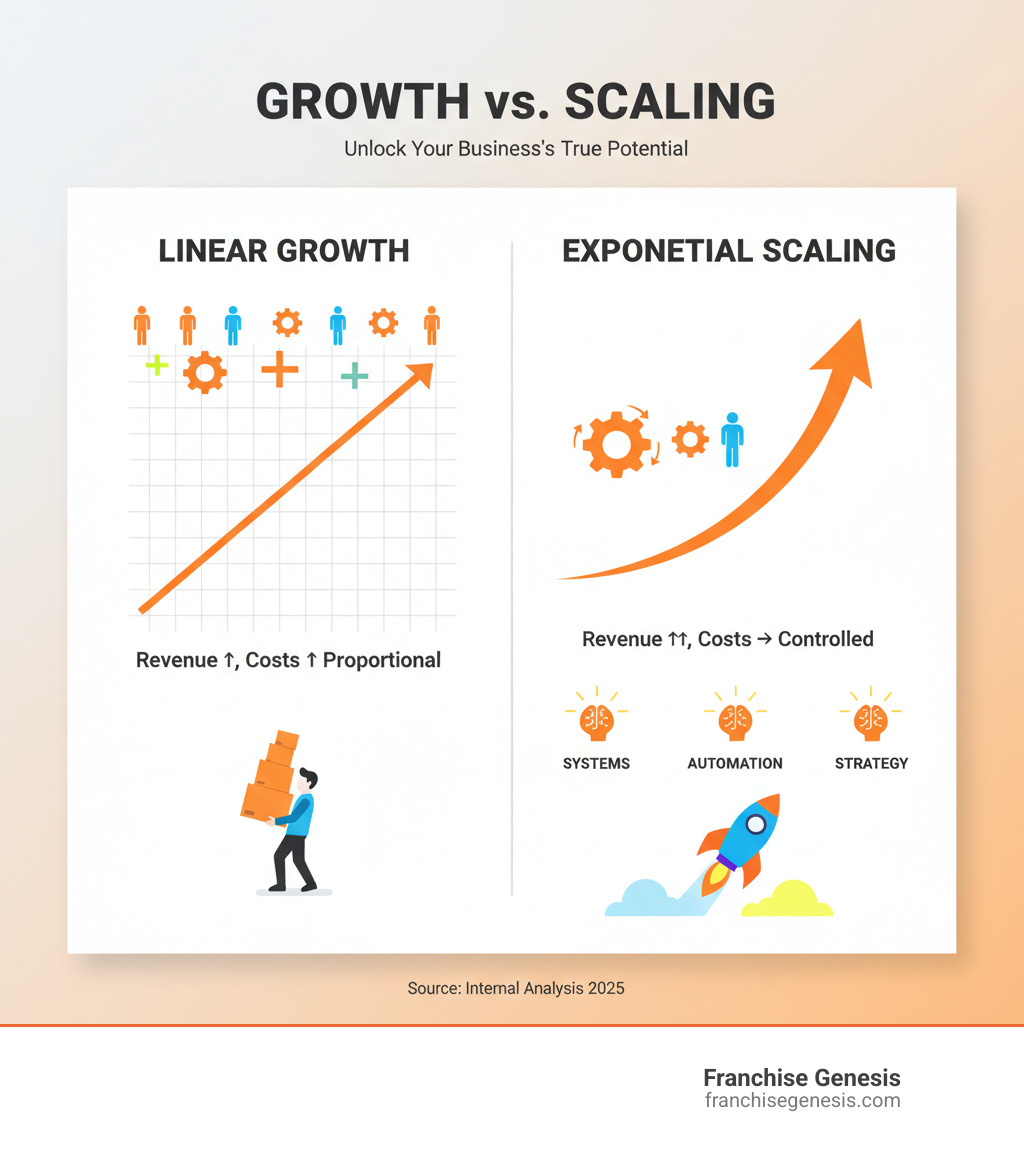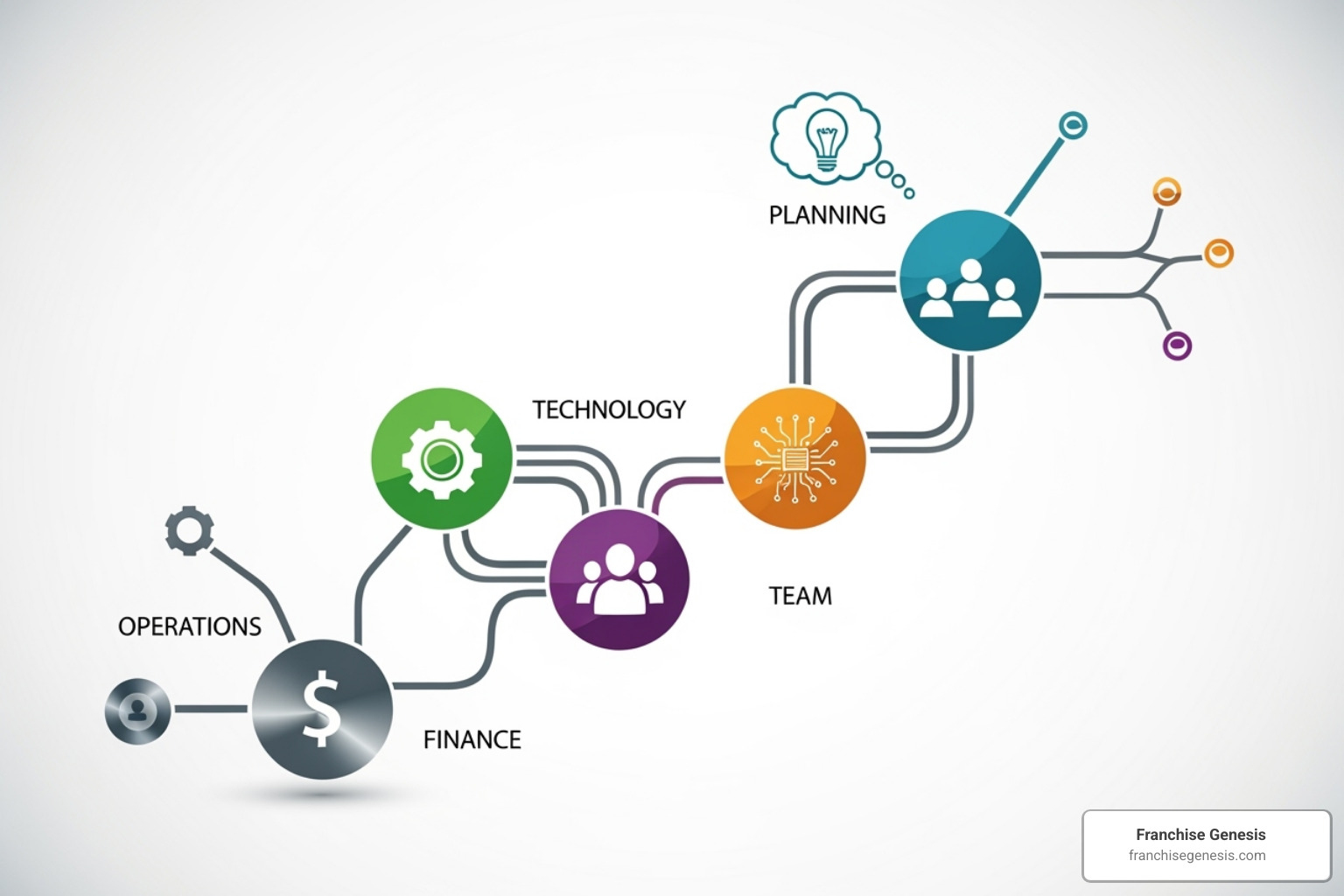From Startup Dreams to Business Empire: Why Scaling Matters
To scale your business successfully, you must implement strategic systems that increase revenue faster than costs grow. This requires a clear understanding of what scaling truly means.
Key Elements of Business Scaling:
- Revenue Growth: Increase income without proportional cost increases.
- Operational Efficiency: Streamline processes and automate repetitive tasks.
- Strategic Planning: Develop a clear vision and measurable goals.
- Team Building: Hire A+ players and master delegation.
- Technology Investment: Leverage automation and scalable systems.
- Financial Management: Secure funding and manage cash flow effectively.
Many business owners reach a point where customer demand outpaces their ability to deliver. The challenge is that growth and scaling aren’t the same thing. Growth means adding resources at the same rate as revenue (e.g., hiring 10 employees for 10 new clients). Scaling means increasing revenue while keeping costs relatively flat by building systems that let 3 employees handle 15 clients.
This distinction determines whether you build a sustainable empire or an expensive job. Smart scaling is a strategic process, not a reaction to demand. While most scaling investments take 6-12 months to show returns, the average ROI can reach 130% and sometimes climb as high as 524%.
I’m Monique Pelle-Kunkle, Vice President of Operations at Franchise Genesis. I’ve helped business owners scale your business through strategic franchise development, guiding one ABA therapy franchise to over 100 locations in its first year. My experience proves that successful scaling requires the right foundation, systems, and strategic approach.

Scale your business basics:
The Foundation: Is Your Business Ready to Scale?
Many business owners hit a wall when they’re too busy fulfilling orders to build systems for future growth. Before you scale your business, you must ensure it’s built on a solid foundation.
Scaling isn’t just getting bigger; it’s getting smarter. While growth adds costs and resources proportionally to revenue, scaling increases revenue exponentially faster than costs. This is achieved by leveraging systems and technology to improve efficiency, creating expanding profit margins.
How do you know if your business is ready? Look for these key readiness indicators:
- Consistent Profitability: Your business must be reliably profitable to fund the investments scaling requires. If margins are thin, scaling will likely backfire.
- Strong Cash Flow: Scaling demands upfront investment. If you’re constantly worried about payroll, stabilize your cash flow first.
- Proven Business Model: Your value proposition must be clear, and your ability to deliver must be consistent. Scaling will only amplify existing problems in your model.
- Sustained Market Demand: The best time to scale is when you have more interested customers than you can currently serve, indicating clear growth potential.
- Overwhelmed Capacity: If your team is stretched thin and you’re turning away business, it’s a clear sign you need to build systems to handle more volume.
Most businesses are ready to scale after at least six months of consistently increasing revenues. This track record proves your foundation can support bigger ambitions.
| Metric | Growth | Scaling |
|---|---|---|
| Revenue | Increases proportionally with resources | Increases faster than resources |
| Costs | Rise with revenue | Rise slower than revenue |
| Resources | Added linearly (more staff for more clients) | Leveraged efficiently (technology enables more output) |
| Profitability | Stable or slight increase | Expands significantly |
Proper scaling transforms your business from a demanding job into a valuable asset that can grow without your daily involvement—the same foundation every successful franchise system is built on.
The Blueprint: Core Strategies to Scale Your Business
Once your business is ready, it’s time to build your scaling blueprint. This strategic roadmap ensures you expand smartly, based on the four pillars of strategic planning, operational efficiency, technology, and financial management.

Develop Your Strategic Scaling Plan
A scaling plan is your north star, preventing you from chasing distracting opportunities. It starts with a clear vision for your business in 3-10 years, which shapes every decision. A detailed business map outlines your current capabilities and the gaps you need to fill to reach your goals. Finally, setting meaningful KPIs beyond revenue—like customer acquisition cost and employee productivity—tells you if your scaling efforts are truly effective.
Be prepared for the “blade period”—the first 3-4 years where growth feels linear as you build systems, refine processes, and establish your culture. Rushing this phase is a common mistake. More info about our franchise growth consultant services can help you steer this critical time with confidence.
Optimize Operations with Technology and Automation
Technology is the engine of scalable businesses. Identify repetitive, low-value tasks and use automation tools to free up your team. Implement CRM systems to track customer interactions and project management software to keep your growing team aligned.
Avoid accumulating “technical debt”—quick, patchy solutions that create long-term problems. Instead, invest in integrated systems that can grow with you. Paying down this technical debt saves countless hours and prevents chaos during expansion.
Technology also streamlines training. Use video tutorials and interactive guides to onboard new team members quickly and consistently. You can even leverage AI systems for training by preloading your standard operating procedures to create a 24/7 knowledge base.
How to Scale Your Business with the Right Model
Your business model determines how easily you can scale your business. While customized service-based businesses are hard to scale due to their reliance on personal expertise, productized services—standardized offerings with defined pricing—are more scalable.
For truly exponential growth, franchising stands out as the premier growth strategy. By franchising, you leverage your franchisees’ capital and energy to expand your brand. They invest their own money and manage daily operations according to your proven systems. This allows for rapid market expansion without the massive capital outlay of opening company-owned locations.
Franchising transforms your business into a true asset, untethering your income potential from your personal hours. Ready to explore this approach? Learn more about Franchise Growth Strategies and find if you’re ready to answer the question: Do you want to grow your business?
The Engine: People, Culture, and Customers
Strategy and technology are vital, but without the right people, culture, and customer focus, your efforts to scale your business will fail. These human elements are the engine that powers sustainable growth.

Build Your A-Team and Master Delegation
You cannot scale alone. You need a talented team that believes in your vision. According to McKinsey research, high performers are 400% more productive than average employees, and up to 800% in complex roles. As Steve Jobs advised, a small team of A+ players is more effective than a large team of B and C players. Compromising on talent early makes it exponentially harder to raise standards later.
Hiring great people is only half the battle; you must also master delegation. Your role must shift from doing to leading. Start by delegating administrative tasks, then consider outsourcing non-core functions like payroll or IT. This allows your internal team to focus on growth activities and is critical for businesses considering franchising, as it helps build scalable support structures.
Cultivate a Culture That Scales
Your company culture defines how your team solves problems and interacts with customers. As the founder, your personality and values are mirrored in the culture, so it’s crucial to make those values explicit and documented. As you grow, especially with franchising, this intentional system is needed to preserve what makes your business special.
A strong culture attracts the right talent and ensures a consistent customer experience across all locations. When you scale your business through franchising, your culture must be teachable and replicable to ensure brand consistency and build lasting loyalty. Understanding the Key to Building a Thriving Franchise Network explores this further.
Maintain an Unbeatable Customer Experience
Rapid growth can threaten the very customer experience that made you successful. Maintaining exceptional service is not optional; it’s what separates successful scaling from failure. Competing on quality and service builds sustainable loyalty.
To achieve this, standardize your processes for every customer touchpoint to ensure consistency. Implement active feedback loops to catch problems early. Provide continuous training so your team embodies your brand values in every interaction.
In a franchise model, this is paramount. Each franchisee is a guardian of your brand promise. Robust training and clear guidelines ensure every customer receives the same high-quality experience, building system-wide success. Learn more about creating this loyalty with our guide to Transform Leads into Loyal Franchisees with a Proven Sales Strategy.
Navigating Challenges and Fueling Your Growth
The journey to scale your business is exciting but brings challenges that test your foundation. With the right preparation, these challenges become stepping stones to success.

Overcoming Common Scaling Problems
Recognizing common challenges is the first step to overcoming them. Watch out for:
- Scaling too fast or too slow: Expanding without proper infrastructure leads to chaos, while being too cautious means missing market opportunities.
- Cash flow issues: Expansion requires upfront investment. Careful financial forecasting is critical to avoid being blindsided.
- Declining quality: When stretched thin, standards can slip. Standardized processes and training are your lifeline.
- Losing the personal touch: Use CRM systems and empower staff to maintain customer connections as you grow.
- Choosing the wrong people: Pressure to hire quickly can lead to poor fits. Never compromise on talent or partners who align with your values.
As Amazon’s Jeff Bezos wrote to shareholders, “Failure comes part and parcel with invention. It’s not optional… we believe in failing early and iterating until we get it right,” according to Business Insider. The key is to learn, adapt, and move forward with resilience.
Financial Planning to Scale Your Business
Strategic financial planning is essential to fuel growth and manage risk. This includes:
- Financial forecasting: Develop detailed revenue and expense projections to map out cash flow and anticipate investment needs.
- Managing working capital: Ensure you have sufficient capital to cover increased operational costs like inventory and payroll during expansion.
- Funding your expansion: Consider your options. Bootstrapping offers control but slower growth. Loans and investors can accelerate growth but come with obligations. Franchising offers a unique advantage, leveraging franchisee capital to expand rapidly with reduced financial outlay.
Scaling investments take time to pay off, often 6-12 months or more. However, the average ROI can be 130%, with some cases reaching 524%. Our expertise in Franchise Sales & Marketing helps you attract the right franchisees, minimizing your financial risk while maximizing growth potential.
Frequently Asked Questions about Scaling a Business
Here are answers to the three most common questions entrepreneurs ask when preparing to scale.
What’s the biggest mistake businesses make when trying to scale?
The biggest mistake is scaling too fast without a solid foundation. Business owners get caught up in the excitement and expand without first investing in the necessary systems, processes, and infrastructure. This “growth at all costs” approach leads to poor planning, neglected systems, and inadequate infrastructure. The result is declining quality, overwhelmed employees, and unhappy customers. Successful businesses build their foundation properly before they scale your business.
How long does it take to see a return on scaling investments?
Most scaling investments take 6-12 months to generate a positive ROI, sometimes longer. Scaling is a marathon, not a sprint. There is a natural lag time as you implement new systems, train staff, and enter new markets. However, the returns can be substantial: the average ROI we’ve seen is 130%, with some cases climbing as high as 524%. The key is to have realistic expectations and commit to a long-term strategy.
Is it possible to scale a business without external funding?
Yes, it’s possible through bootstrapping—reinvesting profits back into the business. This method allows you to maintain complete control and often leads to more sustainable, organic growth. The trade-off is that growth is typically slower, and you might miss market opportunities.
Franchising offers an attractive middle ground. Your franchisees provide the capital for new locations, allowing you to expand rapidly without taking on debt or giving up equity to investors. It combines faster growth with reduced financial risk. The right path depends on your goals, risk tolerance, and timeline.
Conclusion
The journey to scale your business is the chapter where your startup transforms into a sustainable empire. It’s about moving beyond simple growth to build a valuable asset that can thrive without your daily involvement.
As we’ve covered, scaling isn’t about working more hours; it’s about working smarter. It requires building systems that increase revenue while controlling costs, creating processes that handle growth, and shifting your business from being dependent on you to being a self-sustaining asset.
While the road has challenges, the right foundation and strategic approach turn them into stepping stones. For businesses ready for a monumental leap, franchising offers an unparalleled opportunity for Accelerated Brand Growth. It allows you to expand your proven model using the investment and energy of passionate franchisees.
At Franchise Genesis, we specialize in turning successful local businesses into recognized national brands through franchise development. We understand the complexities and opportunities of this journey.
If you have a proven model and a vision for broader impact, it’s time to explore the next level. Your empire isn’t just a dream—it’s a strategic decision away. If you believe your business has this potential, explore how to franchise your business today.
